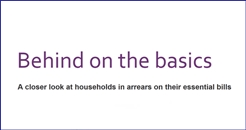 Behind on the basics
Behind on the basics
From a report by StepChange
A closer look at households in arrears on their essential bills
For some people, just keeping up with basic household costs can be a real struggle. In 2017, 140,000 people who received debt advice from StepChange Debt Charity were behind on at least one of their essential household bills, such as an energy bill, council tax, mortgage or rent. This is equivalent to two in five of the clients they advised in 2017.
Their data reveals that within those in financial difficulty, certain groups may be at particularly high risk of falling into arrears, including:
-
Lower income families - have the highest incidence of arrears across all seven main household bills (rent, mortgage, council tax, electricity, gas, water and TV licence)
-
Younger people - have a high proportion in water and council tax arrears.
-
Middle age group (40-59) - were more likely to be in arrears on housing costs – such as their rent or mortgage
-
Renters - have a significantly higher incidence of arrears on essential bills compared to home-owners, despite the incidence of housing arrears being similar between the two groups
-
People with a vulnerability - were more likely to be in arrears. Over half (57%) of vulnerable clients were behind on a household bill, compared to 40% for all clients
These groups are often more likely to have been affected by factors that increase the risk of falling into arrears – namely a squeeze on incomes, rising living costs, insecure work and regular income shocks.
An increasing number of people are turning to credit to keep up with their essential household expenditure. In 2016, around 8.8m people used credit for a household needii. By 2017, this had risen to 9.3m - with 1.4m of these turning to high cost credit. This highlights the predicament that many households have to face: borrowing is often the only way they can find to pay their bills but doing so increases their risk of falling into problem debt.
Their findings raise significant questions about how we ensure people have enough money to pay for the basics. They also raise questions about how people are using credit to cover essentials, and the financial risks they are taking on to do so. Utility companies, landlords, local government and other essential service providers will need to consider how comfortable they are with this situation.
These are difficult questions which require further discussion. They hope the findings set out in this briefing will help contribute to the debate. In addition, they believe there are a number of actions which could be taken now to improve the situation for people in arrears, as well as reducing the risk of people falling behind in the first place:
-
Ensure people in arrears get the right support and forbearance where providers show flexibility and discretion in how arrears are handled. The breathing space scheme will help here, but it is vital that this provides the right length of protection and that all debts to government, such as tax, council tax and benefit overpayments, are included in this
-
Utilities providers, creditors, local government and landlords should consider whether there is more they can do to help those with fluctuating incomes to meet their regular payments, as well as looking at how the costs of essentials bills can be reduced for those struggling to pay
-
The DWP should improve the system whereby payment for arrears can be taken directly from people’s benefits to ensure that these are not causing hardship for families
-
The Government should lead a review looking at how to increase households’ financial resilience, particularly for those in low-paid, insecure work, to help them cope with fluctuating income and income shocks, and to ensure they can meet the costs of their essential household bills
Download the report from here
Retweet about this article:
From a report by StepChange, 26/06/2018